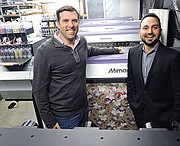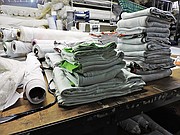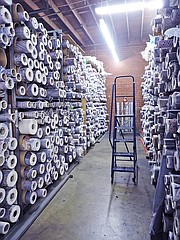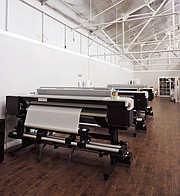TEXTILES
C-Print’s FabFad Wants to Bring Tech to Print Buying
The discussion of technology and textiles tends to focus on new fiber developments or automation within a fabric mill. Los Angeles–based printer and full-package production house C-Print has introduced FabFad, a new way to bring tech into the textile-buying process.
C-Print owner Sean Sabari and FabFad Chief Technology Officer Ryan Berg created the FabFad software to serve as an online platform for designers and fabric buyers to sample and source printed textiles. Users can select from a library of designs, then choose a fabric from a wide range of in-stock textiles or request a specific fabric. The company uses digital sublimation print for polyester, nylon and man-made blends and direct-to-fabric printing for cotton, rayon and silk fabrics. The company offers full-package services as well, including cut and sew, laser cutting and screen-printing.
“We can do hats, wide format for home furnishings, anything with fabric,” Sabari said. “We also supply fabrics.”
FabFad sources its fabrics from the U.S., China, Vietnam, Brazil, Korea and Taiwan.
“You provide the masterpiece; we provide the canvas,” Sabari said, describing FabFad as “the first affordable online printing solution.”
Textiles meets tech
FabFad combines Sabari’s background in printed textiles. He founded C-Print in 2010. Berg, who signed on in 2014, developed the software behind FabFad.
“We worked on it for two years,” said Sabari, who released a beta version of FabFad last year. The latest version of the software—FabFad 2.0—will be released at the end of the first quarter.
The site currently has 1,000 users. On FabFad, users can browse prints and view patterns in full repeat.
The minimum-order requirements are low—5 yards—and there are no setup charges for any quantity or sample orders. Typically, the cost for sample yardage is higher than production, Sabari explained.
“We’ve changed that,” he said. “We level the playing field. It’s the same price for big orders and small.”
The company currently can print 10,000 yards per week. Delivery times range from seven days for expedited delivery of orders of less than 1,000 yards. Orders of 5,000 yards or more will be delivered in 21 days.
“Five thousand, 10,000, 15,000—it doesn’t matter, it’s 21 days,” Sabari said.
Since launching, FabFad has filled more than 3,000 orders and printed nearly 200,000 yards of fabric.
“We’re bridging the gap between industry practices and what we can do with today’s technology,” Berg said.
Print focused
Sabari and Berg plan to roll out additional functionality for FabFad, including allowing users to confine designs if the pattern goes into production. Once a user selects a pattern, the FabFad software will “lock” the design for a certain amount, Sabari said.
“No one else can sample it,” he said.
After a period of time, users can choose if they want to order sample yardage or release the design back into the public library.
FabFad recently partnered with Splash Design Studio to add the New York print studio’s archive of designs to the site’s library.
Sabari said the company is looking to work with other design studios as well.
FabFad keeps track of each client’s order and which printers fulfilled each order. Production orders will be printed on the same machines as the printed strike-off to guarantee a color match.
Expanding to Vernon
C-Print and FabFad are currently in the process of moving its offices from a 15,000-square-foot space in downtown Los Angeles to a 30,000-square-foot space in Vernon, Calif. The new space will allow the company to expand its design and printing facilities as well as the cut-and-sew operations for its full-package production. There will be a 5,000-square-foot “clean room” for digital design and printing. The company has allotted 5,000 square feet for cutting and sewing in the Vernon facility. (The old space in downtown LA has just 1,000 square feet set aside for sewing.)
Sabari plans to begin offering in-house patternmaking as well as 3-D design and patternmaking in Vernon.
“Our goal is to change the way the industry works,” Sabari said.
For more information, visit www.fabfad.com.

























